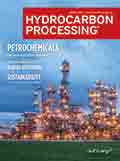
March 2020
Special Focus: Petrochemical Technology
Driven by rising demand for polypropylene, cumene, acrylonitrile and other derivatives, increasing global demand is seen for propylene.
Propylene is at the core of the petrochemical industry, with the synthesis of its numerous derivatives finding greater application in industries from textile to automobile, cosmetics and beyond. Propylene is also a foundation block/intermediate for numerous chemicals, from isopropanol to polypropylene (a widely used synthetic material) to gasoline octane enhancers.
Engineering and Construction
Digital technologies are being widely adopted across nearly every industry. Industrial companies are moving as far away as possible from manual, document-centric processes and replacing them with cloud services, digital solutions and data-centric strategies.
Construction is where the rubber meets the road. This phase historically is the most challenging time of the project, often characterized by problems with high levels of urgency and difficulty.
Maintenance and Reliability
The sulfur recovery unit (SRU) separates sulfur from sulfur compounds.
Process Controls, Instrumentation and Automation
Advanced process control (APC) projects are supervisory programs that are often thought of as a layer of control above the base regulatory control for a process.
Valves, Pumps and Turbomachinery
Centrifugal compressors are widely used in the oil and gas and petrochemical industries, with more than 15,000 operating in the U.S. alone.
In today’s business climate, where project budgets and schedules are under cost and time pressures (and where installed valve applications must perform reliably under increasingly severe conditions), valve simulations are enabling new capabilities.
Reciprocating compressors are used extensively in refinery and petrochemical operations to keep feedstocks and products moving through miles of piping.
Environment and Safety
The world population is expected to reach 9.2 billion people by 2040,1 and the global GDP is also likely to double over that same period.
Engineers often uncover problems or inadequacies with pressure relief valve (PRV) and relief system piping capacities that need creative and cost-effective solutions.
Water Management
Site utility leads, engineers and other professionals in the hydrocarbon/chemical processing industries (HPI/CPI) are facing a perfect storm of increasing demineralized water demand, end of life of existing demineralized water plant equipment, changing source water quality, corporate directives to diversify water sources, and pressure from regulators and community stakeholders to minimize the volume of waste generated from water treatment.
Columns
Each year, <i>Hydrocarbon Processing</i> devotes a Special Focus section to the latest advancements in petrochemical technology, as well as best practices, reliability and safety to ensure efficient and optimized petrochemical operations.
In two separate cases, foresight in the use of strainers on piping and following proper procedures for hydrostatic testing are recommended to preserve the integrity of offshore platforms.
COIM, a specialty chemical company, decided to expand its production capacity in the U.S. to supplement growing market and economy.
Weeks before a planned overhaul of its coker unit, a synthetic crude plant’s main air blower for the furnace failed, throwing the engineers’ plans into disarray.
Saudi Arabia aims to become a major player in the global petrochemicals market within the next several years, with plans to increase domestic and foreign production and expand its exports.
<i>Hydrocarbon Processing's</i> Editor-in-Chief/Associate Publisher, Lee Nichols, was pleased to speak with Jim Becker (JB), Vice President, Polymers and Sustainability for Chevron Phillips Chemical (CP Chem).
Trends and Resources
New perochemical project announcements plateaued year-over-year (y-o-y), according to data from <i>Hydrocarbon Processing’s</i> Construction Boxscore Database.
Crude oil has been the fundamental element of transportation fuel for many decades.
High product inventory levels and weak heating oil demand continued to weigh on U.S. refining economics. European product markets, except gasoil, exhibited positive performance backed by firm exports and heavy turnarounds in the Middle East.

- SkyNRG starts construction on its first SAF plant in Delfzijl, the Netherlands 2/13
- India's Reliance wins U.S. license for Venezuelan oil 2/13
- Singapore light distillates stocks hit over 3-yr high on robust imports 2/13
- Three contractors injured at ExxonMobil facility in Beaumont, Texas (U.S.) 2/13
- China's epic renewables boom lifts it into rare clean capacity club 2/13
- TotalEnergies booked loss in France due to refining activities, CEO says 2/13




